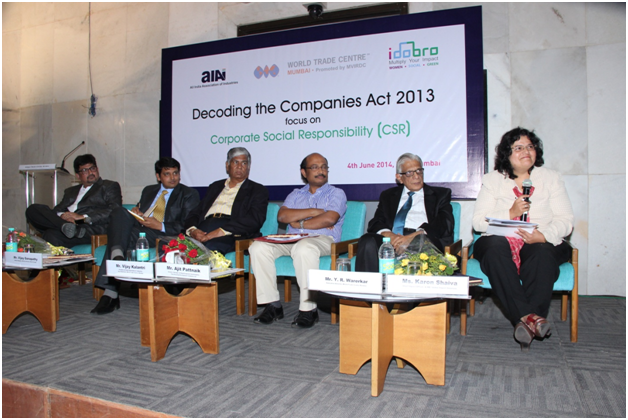“As per the provisions of the Companies Act, 2013 any company having a net worth of rupees 500 crores or more or a turnover of rupees 1,000 crores or more or a net profit of rupees 5 crores or more should mandatorily spend 2% of their net profits per fiscal on CSR activities. Given the mandate it is estimated that nearly 16,500 companies will invest Rs 22,000 crores towards CSR. It is a welcome move for India which is undergoing rapid transformation from developing economy to an advanced economy. The move is expected to bring about “inclusive growth” of one and all”, said Mr. Vijay Ganapathy, Advisory Services, Ernst and Young during a panel discussion on “Decoding the Companies Act 2013 with a focus on Corporate Social Responsibility (CSR) for Indian and Foreign Companies” jointly organised on 4th June 2014 by World Trade Center Mumbai, All India Association of Industries and Idobro.
Enumerating on the implementation part of the CSR Act panelist Mr.Ajit Pattnaik, General Manager & Head-Corporate Sustainability, Tata Housing Development Company Ltd said the broad categories towards CSR activities under the Schedule 7 include education, special education, health care, preventive healthcare, water, sanitation, training in sports, art, culture, rural development projects, etc. Also, the schedule is not restrictive towards geographical boundaries of the beneficiaries.
Mr. Vijay Kalantri, Vice-Chairman, World Trade Center informed the audience that the Indian economy has traditionally engaged in CSR activities towards ensuring livelihood, food and healthcare for all since times immemorial. As of date Corporates can adopt CSR activities in dual ways. Firstly, a standalone company can engage in CSR activities on its own. Secondly, a company can jointly under take CSR activities with an NGO, trust or civil society with a three year track record in similar activities. The Dighi Port being developed under the business acumen of Mr. Kalantri ensures free dispensaries, medicines, free education besides welfare for fisher men in and around the port area of development.
Panelist Dr. Milind Antani, Partner Incharge of Social Development Practice, Nishith Desai Associates elaborated to consequences of non-compliance towards the CSR provisions. It is mandatory to comply with the 2% investment towards CSR or inform the Government the reasons for inability to engage in CSR. Any company which does not report non-compliance towards the CSR rule is liable to be charges of penalty in the bracket of Rs 50 thousand to Rs 50 lakhs. Also, the Board of Directors may be charged with imprisonment for 5 years and/or fine worth Rs 25,000.

Mr. Kalantri updated the audience that CSR provisions cannot be merged with business activities of the corporates. Business activities include provisions which ensure sustainability and growth of a company. However, the need for the hour is to include provisions for PPP, capacity building, due diligence of NGOs in the Act.
Mr. Antani elaborated on NGO expenses towards skill development and compliance activities. It was concluded that NGO expenses which amount to 5% to 10% of CSR activities may be included in the CSR budget under cost overheads.
Mr.Pattnaik clarified on mandates for foreign companies on CSR compliance. It was noted that foreign companies may invest towards CSR activities from their net profit from Indian operations.
The panelist agreed that CSR activities should not be restricted towards 2% of net profit. In order to bring about inclusive growth of the society NGOS, chartable institutes and trusts should partner in Board Room discussions towards the CSR agendas. The corporates and development sector represented by NGOs, chartable institutes and trust must partner in CSR activities to play the balancing act to bring about overall economic growth and prosperity of the nation.
Ms. Karon Shaiva, Chief Impact Officer & MD, Idobro Impact Solutions moderated the panel discussion and Mr. Y.R. Warerkar, Executive Director, MVIRDC World Trade Center proposed the vote of thanks.

 : +91 7718886506
: +91 7718886506